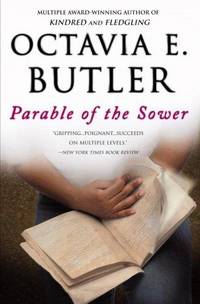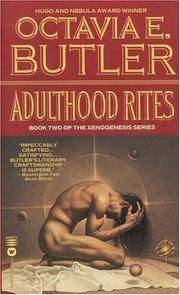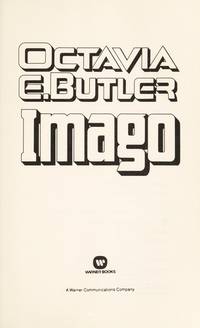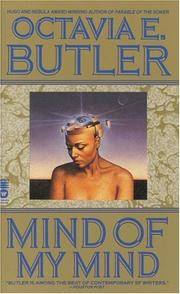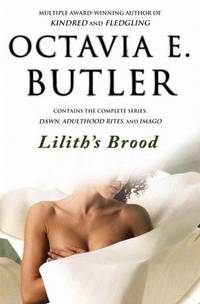Octavia Butler (1947 – 2006)
Octavia Estelle Butler (June 22, 1947- February 24, 2006) was an American science fiction writer, one of very few African-American women in the field.
She won both Hugo and Nebula awards. In 1995, she became the first science fiction writer to receive MacArthur Foundation "Genius" Grant.
Butler was born and raised in Pasadena, California. As her father Laurice, a shoe shiner, died when she was a baby, Butler was raised by her grandmother and her mother (also named Octavia) who worked as a maid in order to support the family. Butler grew up in a struggling, racially mixed neighborhood. According to the Norton Anthology of African American Literature, Butler was "an introspective only child in a strict Baptist household" and "was drawn early to magazines such as Amazing, Fantasy and Science Fiction, and Galaxy and soon began reading all the science fiction classics" .
Octavia Jr., known as "Junie", was thus considered shy and a "daydreamer" and was later diagnosed as being dyslexic. She began writing at the age of 10 "to escape loneliness and boredom"; she was 12 when she began a lifelong interest in science fiction. "I was writing my own little stories and when I was 12, I was watching a bad science fiction movie called Devil Girl from Mars", she told the journal Black Scholar, "and decided that I could write a better story than that. And I turned off the TV and proceeded to try, and I've been writing science fiction ever since."
After getting an associate degree from Pasadena City College in 1968, she next enrolled at California State University, Los Angeles. She eventually left CalState and took writing classes through UCLA extension.
Butler would later credit two writing workshops for giving her "the most valuable help I received with my writing":
* 1969-1970: The Open Door Workshop of the Screenwriters' Guild of America, West, a program "designed to mentor Latino and African-American writers". Through Open Door she met the noted science fiction writer Harlan Ellison.
* 1970: The Clarion Science Fiction Writers Workshop, (introduced to her by Ellison), where she first met Samuel R. Delany.
Career
Her first published story, "Crossover", appeared in Clarion's 1971 anthology; another short story, "Childfinder", was bought by Ellison for the never-published collection, The Last Dangerous Visions. (Like other stories purchased for that volume, it has yet to appear anywhere.) "I thought I was on my way as a writer," Butler wrote in her short fiction collection Bloodchild and Other Stories. "In fact, I had five more years of rejections slips and horrible little jobs ahead of me."
Patternist series
In 1974, she started the novel Patternmaster (reportedly related to the story she started after watching Devil Girl From Mars) which became her first published book in 1976 (though it would become the fifth in the Patternist series). Over the next eight years, she would publish four more novels in the same storyline, though the publication dates of the novels do not match the internal order of the series.
Kindred
In 1979, she published Kindred, a novel which uses the science fiction technique of time travel to explore slavery in the United States. In this story, Dana, an African American woman is taken from 1976 to the turn of the 19th century ante-bellum South. She meets her ancestors, Rufus, a white slave holder, and Alice, an African American woman who was born free but forced into slavery later in life.
This novel is often shelved in literature or African-American literature sections rather than in science fiction — Butler herself categorized the novel not as science fiction but rather as a "grim fantasy" — Kindred became the most popular of all her books, with a quarter of a million copies currently in print. "I think people really need to think what it's like to have all of society arrayed against you," she said of the book.
Xenogenesis
Butler began her Xenogenesis trilogy in 1987. The central characters are Lilith and her genetically altered children. Lilith, along with the few other surviving humans, are abducted by extraterrestrials, the Oankali, after a "handful of people [a military group] tried to commit humanicide," leading to a missile war which destroyed much of Earth. The Oankali have a third gender, the ooloi, who have the ability to manipulate genetics, plus sexually seductive neural stimulating and consciousness-sharing powers. The Oankali are biological traders, driven to share genes with other intelligent species, changing both parties. The entire series, Imago, was released in 2000 as the single volume, Lilith's Brood.
Parable Of the Sower
In 1994, her dystopian novel Parable of the Sower was nominated for a Nebula for best novel, an award she finally took home in 1999 for a sequel, Parable Of the Talents. The two novels provide the origin of the fictional religion Earthseed.
Butler had originally planned to write a third Parable novel, tentatively titled Parable of the Trickster, mentioning her work on it in a number of interviews, but at some point encountered a form of writer's block, going seven years without publishing a new novel.
Fledgling
She eventually shifted her creative attention, resulting in the 2005 novel, Fledgling, a vampire novel with a science fiction context. Although Butler herself passed Fledgling off as a lark, the novel is connected to her other works through its exploration of race, sexuality, and what it means to be a member of a community. Moreover, the novel continues the theme, raised explicitly in Parable of the Sower, that diversity is a biological imperative.
Short stories
She published a collection of her shorter writings, Bloodchild and Other Stories, in 1995. The collection includes five short stories spanning Butler's career, the first finished in 1971 and the last in 1993. Bloodchild, the title story, concerns humans who live on a reservation on an alien planet ruled by worm-like creatures. The worm-creatures breed by implanting eggs in the humans, who they share a symbiotic existence with. Many have suggested that the story is about slavery, though in her own afterword Octavia claims that it is her 'male pregnancy story', and also that writing it was her way of overcoming a phobia of bot flies.
In 2005, Seven Stories Press released an expanded edition.
Butler moved to Seattle in November 1999. In October 2000, she received an award for lifetime achievement in writing from the PEN American Center. She described herself as "comfortably asocial--a hermit in the middle of Seattle--a pessimist if I'm not careful, a feminist, a Black, a former Baptist, an oil-and-water combination of ambition, laziness, insecurity, certainty, and drive." Themes of both racial and sexual ambiguity are apparent throughout her work.
She died outside of her home on February 24, 2006, at the age of 58. Some news accounts have stated that she died of head injuries after falling and striking her head on her walkway, while others report that she apparently suffered a stroke.
Butler was born and raised in Pasadena, California. As her father Laurice, a shoe shiner, died when she was a baby, Butler was raised by her grandmother and her mother (also named Octavia) who worked as a maid in order to support the family. Butler grew up in a struggling, racially mixed neighborhood. According to the Norton Anthology of African American Literature, Butler was "an introspective only child in a strict Baptist household" and "was drawn early to magazines such as Amazing, Fantasy and Science Fiction, and Galaxy and soon began reading all the science fiction classics" .
Octavia Jr., known as "Junie", was thus considered shy and a "daydreamer" and was later diagnosed as being dyslexic. She began writing at the age of 10 "to escape loneliness and boredom"; she was 12 when she began a lifelong interest in science fiction. "I was writing my own little stories and when I was 12, I was watching a bad science fiction movie called Devil Girl from Mars", she told the journal Black Scholar, "and decided that I could write a better story than that. And I turned off the TV and proceeded to try, and I've been writing science fiction ever since."
After getting an associate degree from Pasadena City College in 1968, she next enrolled at California State University, Los Angeles. She eventually left CalState and took writing classes through UCLA extension.
Butler would later credit two writing workshops for giving her "the most valuable help I received with my writing":
* 1969-1970: The Open Door Workshop of the Screenwriters' Guild of America, West, a program "designed to mentor Latino and African-American writers". Through Open Door she met the noted science fiction writer Harlan Ellison.
* 1970: The Clarion Science Fiction Writers Workshop, (introduced to her by Ellison), where she first met Samuel R. Delany.
Career
Her first published story, "Crossover", appeared in Clarion's 1971 anthology; another short story, "Childfinder", was bought by Ellison for the never-published collection, The Last Dangerous Visions. (Like other stories purchased for that volume, it has yet to appear anywhere.) "I thought I was on my way as a writer," Butler wrote in her short fiction collection Bloodchild and Other Stories. "In fact, I had five more years of rejections slips and horrible little jobs ahead of me."
Patternist series
In 1974, she started the novel Patternmaster (reportedly related to the story she started after watching Devil Girl From Mars) which became her first published book in 1976 (though it would become the fifth in the Patternist series). Over the next eight years, she would publish four more novels in the same storyline, though the publication dates of the novels do not match the internal order of the series.
Kindred
In 1979, she published Kindred, a novel which uses the science fiction technique of time travel to explore slavery in the United States. In this story, Dana, an African American woman is taken from 1976 to the turn of the 19th century ante-bellum South. She meets her ancestors, Rufus, a white slave holder, and Alice, an African American woman who was born free but forced into slavery later in life.
This novel is often shelved in literature or African-American literature sections rather than in science fiction — Butler herself categorized the novel not as science fiction but rather as a "grim fantasy" — Kindred became the most popular of all her books, with a quarter of a million copies currently in print. "I think people really need to think what it's like to have all of society arrayed against you," she said of the book.
Xenogenesis
Butler began her Xenogenesis trilogy in 1987. The central characters are Lilith and her genetically altered children. Lilith, along with the few other surviving humans, are abducted by extraterrestrials, the Oankali, after a "handful of people [a military group] tried to commit humanicide," leading to a missile war which destroyed much of Earth. The Oankali have a third gender, the ooloi, who have the ability to manipulate genetics, plus sexually seductive neural stimulating and consciousness-sharing powers. The Oankali are biological traders, driven to share genes with other intelligent species, changing both parties. The entire series, Imago, was released in 2000 as the single volume, Lilith's Brood.
Parable Of the Sower
In 1994, her dystopian novel Parable of the Sower was nominated for a Nebula for best novel, an award she finally took home in 1999 for a sequel, Parable Of the Talents. The two novels provide the origin of the fictional religion Earthseed.
Butler had originally planned to write a third Parable novel, tentatively titled Parable of the Trickster, mentioning her work on it in a number of interviews, but at some point encountered a form of writer's block, going seven years without publishing a new novel.
Fledgling
She eventually shifted her creative attention, resulting in the 2005 novel, Fledgling, a vampire novel with a science fiction context. Although Butler herself passed Fledgling off as a lark, the novel is connected to her other works through its exploration of race, sexuality, and what it means to be a member of a community. Moreover, the novel continues the theme, raised explicitly in Parable of the Sower, that diversity is a biological imperative.
Short stories
She published a collection of her shorter writings, Bloodchild and Other Stories, in 1995. The collection includes five short stories spanning Butler's career, the first finished in 1971 and the last in 1993. Bloodchild, the title story, concerns humans who live on a reservation on an alien planet ruled by worm-like creatures. The worm-creatures breed by implanting eggs in the humans, who they share a symbiotic existence with. Many have suggested that the story is about slavery, though in her own afterword Octavia claims that it is her 'male pregnancy story', and also that writing it was her way of overcoming a phobia of bot flies.
In 2005, Seven Stories Press released an expanded edition.
Butler moved to Seattle in November 1999. In October 2000, she received an award for lifetime achievement in writing from the PEN American Center. She described herself as "comfortably asocial--a hermit in the middle of Seattle--a pessimist if I'm not careful, a feminist, a Black, a former Baptist, an oil-and-water combination of ambition, laziness, insecurity, certainty, and drive." Themes of both racial and sexual ambiguity are apparent throughout her work.
She died outside of her home on February 24, 2006, at the age of 58. Some news accounts have stated that she died of head injuries after falling and striking her head on her walkway, while others report that she apparently suffered a stroke.

